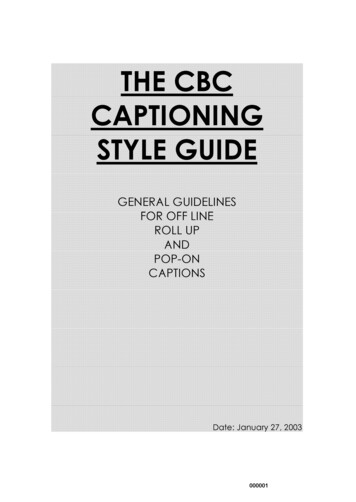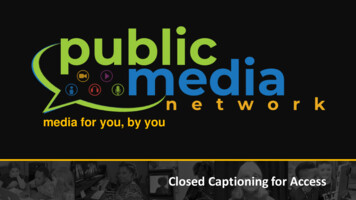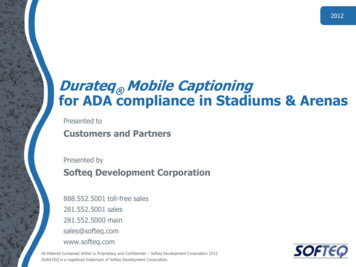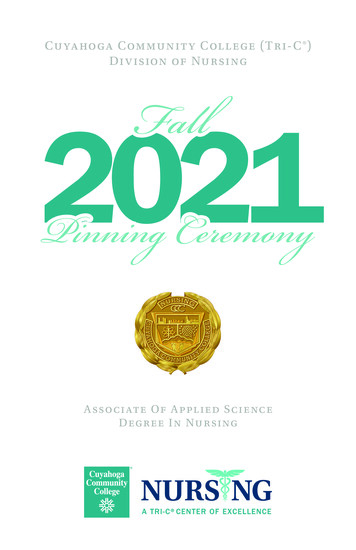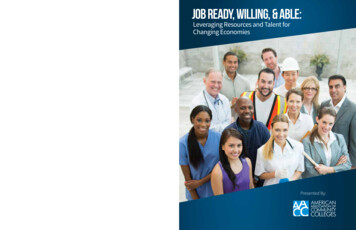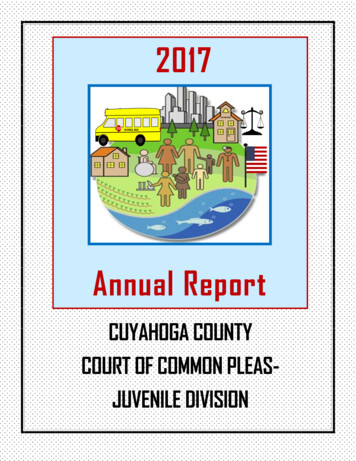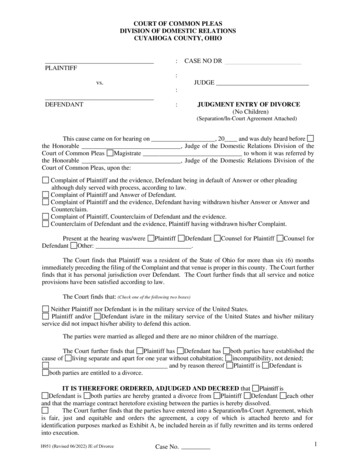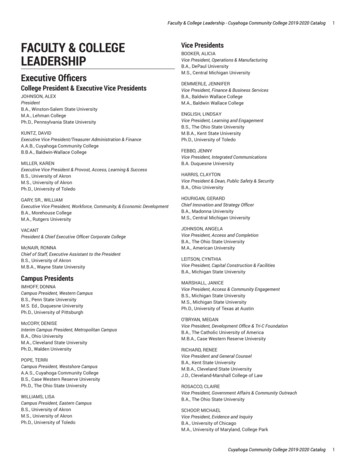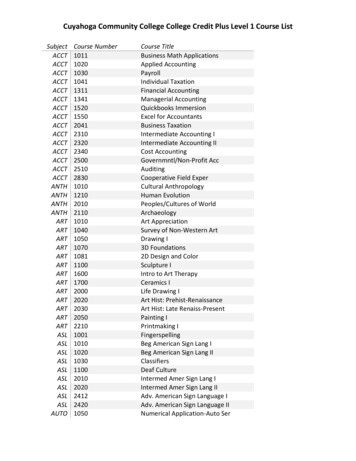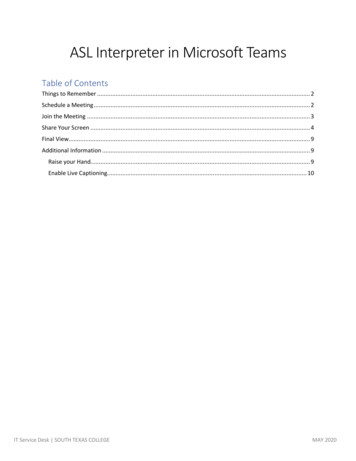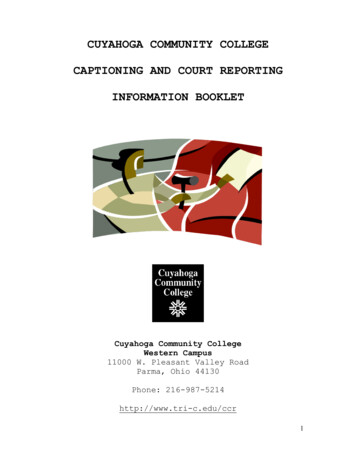
Transcription
CUYAHOGA COMMUNITY COLLEGECAPTIONING AND COURT REPORTINGINFORMATION BOOKLETCuyahoga Community CollegeWestern Campus11000 W. Pleasant Valley RoadParma, Ohio 44130Phone: 216-987-5214http://www.tri-c.edu/ccr1
Imagine being a part of . . . the drama of the courtroom, where life and deathdecisions are made or the excitement of a boardroom, where businessdeals are negotiated or the creation of television programming, where your workreaches a national audience or the satisfaction of the classroom, where you assiststudents with physical challenges!2
WHAT IS A COURT REPORTER?A court reporter is an individual who utilizesa stenotype machine, voice writing, or digitaltechnology to capture all the spoken words in alegal proceeding or other event. These words canbe presented on computer or television screens,displaying the instant voice-to-text translation.The captured words can also be translated into textfor use in documents such as trial transcripts,medical reports, and so on.Specialized software enables this voice-to-texttranslation. Students learn to use this softwarewith either a stenotype machine, speechrecognition, or digital-recording technology.This is a list of some of the employmentopportunities that exist with court reportingtechnology training:Official Court ReporterFreelance ReporterCART ProviderBroadcast CaptionerConvention ReporterWebcasterScopistMedical TranscriptionistLegal Transcriptionist3
CAREER OUTLOOKHighly-trained, skilled, and certifiedcourt reporters and captioners are in huge demandall around the country.POTENTIAL EARNINGSJudicial reporters earn an average of 65,000 to 72,000CART providers earn an average of 35,000 to 65,000Medical transcriptionists and scopists earn an average of 31,000 to 40,000Captioners earn an average of 45,000 to 80,000*Information obtained from www.ncraonline.org and www.bls.govFor more information about careers in the Captioning andCourt Reporting industry, visit the following websites:www.ncra.org, National Court Reporters Associationwww.nvra.org, National Verbatim Reporters Associationwww.aaert.org, American Association of ElectronicReporters and Transcribers4
CAREER TRACKSJudicial Reporting: Positions may be attained either in afreelance office and hired by attorneys to reportdepositions or employed by the courts. The U.S. Departmentof Labor projects that court reporting job opportunitieswill grow as fast as the average for all occupations.CART (Communication Access Realtime Translation) providers:CART is a word-for-word speech-to-text interpreting servicefor people who need communication access. Work in a varietyof settings providing instant translation to the hearing orvisually impaired. A CART provider renders instant speechto-text translation on a computer monitor or other displayfor the benefit of an impaired individual or larger groupin a variety of settings. Some CART environments includethe following: business, government, educationalfunctions, classrooms, courtrooms, religious services,senior citizen meetings, conventions/conferences, bankingand investment transactions, or anywhere communicationaccess is needed. A CART provider is sensitive to thevarying needs of the person(s) for which the serviceprovided.Broadcast Captioning: Captioning of live televisionprograms is done by specially trained court reporterscalled broadcast captioners. Federal rules requirecaptioning of hundreds of hours of live programming eachweek, creating a surge in career opportunities. The demandfor jobs in broadcast captioning is expected to grow 300%.Off-line captioning opportunities are available.Transcriptionist: A variety of opportunities exist totranscribe digitally recorded court proceedings ordepositions and dictated materials created by doctors,lawyers, law enforcement investigators and so forth thatneed to be transferred into document form.Scopist: Court reporters often employ individuals to assistin editing and proofreading their transcripts. Theseworkers, known as scopists, use their knowledge of legalproceedings and steno or voice technology in the productionof a final transcript.5
TECHNOLOGY CHOICESIndividuals who work in the court reporting industry mayutilize either steno machine, voice writing or digitalrecording software technology to accomplish their work.Each method prepares students for entry-level employment invoice-to-text translation opportunities, such as jobs asjudicial and/or freelance reporters, CART providers,captioners, transcriptionists, and so on.Steno Machine WritersStudents learn to use a stenotype machine and specializedsoftware to type (write) spoken words and have themtranslated into text. Students learn a special language,known as theory, to enable them to type at a goal speed of225 words per minute.A stenotype machine is a computer-compatible device whichhas 22 keys and the number bar designed to be manipulatedin a particular manner that permits multiple words to bewritten with one keystroke.Steno machine keyboardIndustry-specific software is used to allow the stenomachine to communicate and interact with your computer sothat what is written on the steno machine is translatedinto English and displayed on computer screens in realtime.Steno writing students learn to write at the exit speed of225 words per minute.6
Voice WritersStudents learn to use a speech recognition engine andspecialized software to listen and repeat (dictate) spokenwords and have them translated into text. Students learnto dictate in a manner that enables them to voice write atthe exit speed of 225 words per minute.A voice writing speech recognition engine is software thatis trained to recognize an individual’s voice and createvocabulary that represents multiple words spoken in onesyllable. We teach students to use Dragon and Eclipse, acomputer-assisted translation software for court reporters.Voice writing is used in many states in the country. Thisoption uses an open mic headset or a voice mask throughwhich the reporter’s voice translates into realtimetechnology on to a computer screen. This option is muchlike the steno machine, but the reporter’s voice is usedtogether with special equipment to translate. The samecareer tracks above are available to voice writers.Digital Reporting and TranscriptionJudicial digital court reporters are the people who capturethe record of legal proceedings. This can be done incourtrooms, hearing rooms, or conference rooms.Microphones and digital recording software programs, alongwith perhaps a camera, capture words of witnesses,attorneys, the judge, and others who are present and/orparticipating in the proceeding.Legal transcriptionists listen to dictated recordings madeby court reporters, attorneys, paralegals, and other legalprofessionals and then transcribe them into legaldocuments. These recordings are generally delivered andreturned digitally via a drop box or other program. Thetranscriptionist listens to the recordings with a headsetand types the text into their computer, using a foot pedalto pause, rewind and replay as needed.In conjunction with digital court reporters who capture therecord with microphones, that speech is often convertedinto a rough draft text using a speech recognition systemand artificial intelligence. The transcriptionist thenreviews that rough draft and plays the audio of therecorded legal proceedings to create a verbatim transcriptof the event.7
EDUCATIONAL OPTIONSAssociate of Applied Business Degree (applicable to Stenoand Voice Writing methods):After completing a full complement of academic and skillspecific courses, students obtain an Associate of AppliedBusiness with a concentration in Captioning and CourtReporting. Students must complete 62-64 credit hours ofstudy for steno and 60-62 credits for voice. This includesthe completion of five general education courses totaling15 credits. The Captioning and Court Reporting Departmentstrongly recommends that students complete all therequirements for the associate degree. This degree hasbeen approved by The Higher Learning Commission of theNorth Central Association of Colleges and Schools. CuyahogaCommunity College credits are transferrable to othercolleges and educational institutions. This leads toemployment as a court reporter, broadcast captioner, and/orCART provider.Certificate of Proficiency in Captioning and CourtReporting Certified Steno or Voice Writing:Previously degreed students or those not seeking a degreemay elect to complete only those courses which meet NCRAand NVRA guidelines. This certificate has been approved byThe Higher Learning Commission of the North CentralAssociation of Colleges and Schools. It prepares studentsfor the same employment opportunities as the Associate ofApplied Business degree. Total credits for steno are 48-52and 46-50 for voice.Court Reporting Technologies Short-Term Certificate:Steno and voice writing students who reach a speed of 140words per minute and take the required 41 credit hoursobtain this short-term certificate which has been approvedby The Higher Learning Commission of the North CentralAssociation of Colleges and Schools. It leads toemployment opportunities for scopists or transcriptionistsin court reporting firms, doctor’s offices, or as anindependent contractor.8
Voicewriting Short-Term Certificate:Students who complete this certificate may begin entrylevel employment as a judicial reporter, broadcastcaptioner, and/or CART provider. This certificate has beenapproved by The Higher Learning Commission of the NorthCentral Association of Colleges and Schools. Total creditsare 29. The Captioning and Court Reporting Departmentstrongly recommends that students stack these credentialson to securing either the Certificate of Proficiency inCaptioning and Court Reporting Certified Voice Writing orthe associate degree.Digital Reporting and Transcription Short-Term Certificate:Students who complete this certificate may begin entrylevel employment as a judicial reporter and/ortranscriptionist. Total credits are 24.GETTING STARTED ATCUYAHOGA COMMUNITY COLLEGEENROLLMENT PROCESS - It’s as easy as 1, 2, 3!1. Apply to Cuyahoga Community College – it’s free!TIPS WHEN APPLYING: CHOOSE WESTERN CAMPUS AS YOURCAMPUS OF CHOICE (no ONLINE option available)AND OTHER IF YOUR HIGH SCHOOL IS NOT LISTED New students to college start w.tri-Checklist: ions-pr-nocrops.pdf Transfer students start here (coming to Tri-C fromanother college or with college rstudents.htmlChecklist: .html Returning students start here (you have not registeredfor a Tri-C class in the last year): s.htmlChecklist: r-student-checklist.pdf9
2. Plan your semester schedule and register. Set up an appointment via email, phone, and/or WebEx withKelly.Moranz@tri-c.edu – Program Director – forassistance in putting together and individualized planand schedule for success.Register for course offerings based on the plan developedand outlined suggested sequence (see below beginning onpg. 17 of this booklet).3. Secure your equipment. Students must have their equipment once they start thetheory classes in either steno (Realtime Theory I) orvoice (Voicewriting I) tracks.Supplies and EquipmentMACHINE SCHOLARSHIP OPPORTUNITYThe machine scholarship provides local students taking theRealtime Theory and speedbuilding sequences the use of asteno machine (value of 2000) for two years. Pleasecontact Kelly.Moranz@tri-c.edu - Program Director - foradditional information and to determination of eligibility.Please note this opportunity is limited to the number ofmachines available and residence.PURCHASING OR RENTING A STENO MACHINEStudents who are enrolled in the Realtime Theory (CCR 1300)must have a working, computer compatible stenotype machineto begin.Note: Financial aid can be used to purchase your stenomachine prior to the start of the semester through theWestern Campus bookstore by using your book allotment andpotentially emergency funds. Please contactKelly.Moranz@tri-c.edu for more details.Students need to purchase a new or used computer-compatiblesteno machine. Additionally, in order for your machine tobe compatible with DigitalCAT, the computer-aidedtranscription (CAT) software utilized, purchase of anIOGEAR brand USB to serial adapter is necessary for somemodels. Students are encouraged to contact the ProgramDirector or faculty for information on steno machinepurchases.10
The following is a list of companies that sell and/or rentnew or used/refurbished steno machines: www.stenoworks.com – Contact: Kerry Brunner. Theprogram utilizes this vendor and used machines comewith a warranty. Rental options are available. www.stenograph.com - Manufacturer and seller of stenomachines. New and used machines available. www.acculaw.com – Seller of used steno machines.Steno machines come with keys that are all the same size. It isrecommended students order wide keys for the asterisk (*) key aswell as the final –D and – Z keys as this makes writing on themachine easier.DIGITALCAT COMPUTER-ASSISTED SOFTWARE BY STENOVATIONSSteno students must also purchase DigitalCAT software fromStenovations. This is a transcription program designed just forcourt reporters. DigitalCAT translates the steno keystrokes intoEnglish in a transcript format. The cost of DigitalCAT is 25every 100 days. Students arrange the purchase directly throughStenovations at www.stenovations.com.PURCHASING VOICE WRITING EQUIPMENT:Students who are enrolled in Voicewriting I (CCR 1200) musthave a computer and voice writing software to begin. Pleasebe sure to check with your instructor or program directorbefore making purchases.Note: Financial aid can be used to purchase your voicewriting equipment prior to the start of the semesterthrough the Western Campus bookstore by using your bookallotment and potentially emergency funds. Please contactKelly.Moranz@tri-c.edu for more details.Students need to purchase the following:1. Voicewriting I - Dragon Naturally SpeakingProfessional, DPI, Version 15. Students may purchasethe software directly from www.nuance.com, Amazon oranother reputable source.Headset with an open microphone. Professionalsrecommend purchasing a Logitech brand.11
2. Voicewriting II – Steno mask and USB adapter.Available at www.techtalk.com.3. Voicewriting III – EclipseVox student software.Students can purchase the software from AdvantageSoftware, http://www.eclipsecat.com. Periodically,the CCR Program supplies this software based onavailability.REALTIME COACHRealtime Coach, our practice and testing platform, isrequired each semester in which you are using your steno orvoice technology. It is considered a “book” if usingfinancial aid funds. If financial aid funds are notavailable, it can be purchased directly from Realtime Coachat a slightly lower cost.Other supplies, equipment, and costs include textbooks,paper, three-ring binders, and lab fees.ONLINE LEARNINGCuyahoga Community College offers students the ability to studyfrom remote locations. CCR courses are designed to teach thestudent how to develop skills in a distance-learning format.You will need basic computer skills and should be comfortableusing a word processing program, browsing for files, copying andpasting between programs.Additionally, you will need a computer that connects to theInternet. A laptop is strongly recommended along with a laptopcooling pad. Voice writing students should consider a computerwith at least 4G of RAM, preferably 8G for best performance.****PLEASE NOTE: For the Captioning and CourtReporting Program, Apple/MAC products are notcompatible with the software that is used in ourprogram.For more information about online learning, visit Tri-C OnlineLearning website. (http://www.tri-c.edu/online).12
FREQUENTLY ASKED QUESTIONS . .1.What career options do I have after completing thisprogram?a. Cuyahoga Community College’s Captioning and CourtReporting (CCR) Program provides education and realtimetraining that prepare you to succeed in rewarding,high-tech careers. Career options include thefollowing: Working in the legal arena as a judicial orfreelance reporter; working in the educationenvironment as a Communication Access RealtimeTranslation (CART) provider; working in the broadcastenvironment as a closed captioner; working in themedical field as a medical transcriptionist or in otherindustries doing transcription work.b. A career in court reporting offers flexibility. Youmay want to work from home or you may want to work moreor less hours on different days of the week.2.Is court reporting a growing field?Court reporting is a high-demand and expanding field.Career opportunities have emerged for court reportersgenerally, and there is expected to be substantialgrowth in the area of captioning. There is continuedstrong growth for freelance and official reporters aswell as transcriptionists and CART providers.3.Does Cuyahoga Community College offer comprehensivetraining?Yes. Cuyahoga Community College offers a curriculumthat meets the challenges and opportunities presentedby the modern workplace. We offer hands-on, studentfocused training.4.Do the Court Reporting faculty at Cuyahoga CommunityCollege have experience working as court reporters?Yes. You will learn from instructors who work presentlyor who had actually worked in the field for severalyears. All faculty members have college degrees and holdvarious NCRA and/or NVRA certifications. In addition,our faculty have won numerous awards for their onlineteaching methods. One faculty member is a steno meritspeed writer.13
5.Is the program accredited?Yes. Cuyahoga Community College is an accredited collegeand approved by the North Central Association of Collegesand Schools. The Tri-C CCR Program is approved by NCRA(National Court Reporters Association) and AmericanAssociate of Electronic Reporters and Transcribers(AAERT) along with being affiliated with NVRA (NationalVerbatim Reporters Association).6.How should I decide which technology/path is best for me?Reach out to our Program Director, Kelly.Moranz@tri-c.eduto further discuss individual preferences, goals,physical location to gain personalized advice todetermine the best track.7.May I complete the program on a part-time basis?Yes. Many of our students work full-time and otherresponsibilities. The CCR Program Director,Kelly.Moranz@tri-c.edu, can assist in putting togethera plan for success.8.May I do this entire program as an online option?Yes! The entire CCR program is available online. Ourtwo full-time faculty members have advanced degrees inonline instructional design – you are in great hands!9.Are there set meeting times for courses?While there are no set meeting times, assignments areassigned and due weekly. In addition, scheduled chatsare held by instructors for various courses. It isstrongly encouraged that you attend live. However, ifyou are not able to attend, they are recorded and putinto your course site so that you can review it at alater time.10.What if I’m having a difficult time with attainingspeed -- will I be asked to drop out of the program?No. Students are never asked to drop out of theprogram. To assist students in obtaining thenecessary speeds, extra enhancement materials andclasses are added to the curriculum or sometimesstudents might have to repeat certain speed classes.Our instructors work closely with students tofacilitate progress.11.How do I get in touch with my instructors?Our instructors pride themselves on being accessible.You can reach out to them through the discussionboards in the course site, email, text, and, ofcourse, via WebEx.14
12.What makes Tri-C different from other court reportingschools in the area? Why should I go to Tri-C?Tri-C offers a quality education from nationallyrecognized faculty. Three of our instructors havebeen named NCRA Educators of the year and one is aFellow of the NCRA. Our program has been in existenceat Tri-C for over 40 years and has been providingonline instruction for over 20 years. Throughout thehistory of the program, every graduate has attainedemployment at the completion of his/her course ofstudy.Students benefit from the lowest tuition costs forcourt reporting training in the state of Ohio and oneof the lowest nationally. Our program providesflexible options for instruction and training and jobplacement assistance anywhere in the country.Additionally, we train students to be realtimewriters, the highest standard in the industry,providing you with the widest employmentpossibilities. We encourage students to investigateother programs as we are confident that CuyahogaCommunity College’s CCR Program stands out incomparison providing the highest caliber ofinstruction.13.Is financial aid available?Yes. The College participates in all financial aidprograms such as Pell, OIG, and others.Financial aid is available in the form of various grants,student loans, Veteran’s programs, and scholarships. Forscholarship information, visit www.tric.edu/scholarships.A special court reporting scholarship, the AngelaHergenroeder Scholarship, assists qualifying courtreporting students. We are also a Project Steno Partner.14.What steno theory is taught at Tri-C?The CCR faculty-created theory takes the best aspectsof numerous theories that our faculty have used andreviewed; incorporates concepts of steno writing thatresult in the fewest strokes possible; writing themost commonly heard words with the easiest ofconflicting-homophone entries; and providingindividuals the ability to modify and personalizewriting style and dictionaries as soon as possible.It is a compilation of years and years of experiencewith steno and is built on established academiclearning and skill development theories for the mostefficient and effective use of the keyboard andlanguage ensuring excellent realtime writing skill.This includes a built-in dictionary with over 142,00015
entries. Students who learn this theory are ready forentry-level realtime work.15.What kinds of skills do I need to be successful in the CCRProgram?A positive attitude with a strong desire to do wellalong with the self-discipline to practiceindependently will support the successful steno orvoice student.16.Are students able to obtain on-the-job training whileattending school?Steno and voice students must serve a 75-hour internshipas part of the required curriculum. When a studentreaches the 200-wpm level of speed, he/she is placed inthe courts, freelance firms, and/or with captioner/CARTproviders to attend sessions/depositions with a practicingreporter while continuing their studies at Tri-C.17.How much time will I need to practice as a steno or voicestudent?Practicing is an individual decision; however, the minimumis 15 hours per week for steno and voice writers. Speedcomes easier to some students than others. Ideally,faculty recommend approximately three hours a day ofpractice. A student who practices less than three hours aday can still be successful, but should anticipate alengthier course of study.18.What are Tri-C’s costs?i. Tuition costs as of Summer 2022 Semester:ii. Cuyahoga County residents - 124.54 per credit houriii. Ohio residents (outside Cuyahoga County) - 154.08per credit houriv. Out-of-state residents - 291.19 per credit hour19.Whom should I talk with to get additional information?If you would like the information, please contact:Kelly Moranz, Program Director at 216-987-5214,kelly.moranz@tri-c.eduJimi Gonzalez, Program Assistant at 216-987-5113jimi.gonzalez@tri-c.edu16
STENO WRITING DEGREE AND CERTIFICATE OPTIONSS404-CCR: Captioning and Court Reporting Associateof Applied Business in Steno WritingEffective Catalog Fall 2022Suggested Semester SequenceFirst SemesterCCR 1000Introduction to StenoCCR 1300Realtime Theory ICCR 1350Legal TerminologyCCR 1360Court ProceduresENG 1010 or College Composition I orENG 101HHonors College Composition I14333creditcreditscreditscreditscreditsSecond SemesterCCR 1331Realtime Theory IICCR 1335Realtime Theory IIICCR 2351Editing Legal DocumentsCCR 2200Medical Terminology for CCRHUM 1010 or Introduction to HumanitiesPHIL 2020or er SemesterCCR 1341Realtime Theory IVCCR 1451Speedbuilding andTranscription at 140 WPMCJ 1120Criminal Court Procedures(offered in summer only)Third SemesterCCR 2401Speedbuilding andTranscription at 180 WPMCCR 2602Technical TerminologyCCR 1601Court Reporting TechnologyPSY 1010 or General PsychologyANTH 1010Cultural Anthropologyor SOC 2410 Sociology of GenderMATH 1xxx1000-level Math or higherFourth SemesterCCR 2451Speedbuilding andTranscription at 225 WPMCCR 2470Advanced TechnologyCCR 2841InternshipCCR XXXXElective-1460, 1470 or 2360GEN EDCommunication requirement2 credits3 credits2 credits3 credits3 credits4 credits3 credits3 credits3 credits3 credits2 credits3 credits3 credits64 total credits17
S407-CCR: Captioning and Court Reporting Stenowriting,Certificate of ProficiencyEffective Catalog Fall 2022Suggested Semester SequenceFirst SemesterCCR 1000Introduction to StenoCCR 1300Realtime Theory ICCR 1350Legal TerminologyCCR 1360Court Procedures1433SecondCCRCCRCCR2 credits2 credits3 creditsSemester1331Realtime Theory II1335Realtime Theory III2351Editing Legal DocumentsSummer SemesterCCR 1341Realtime Theory IVCCR 1451Speedbuilding andTranscription at 140 WPMCJ 1120Criminal Court Procedures(offered in summer only)Third SemesterCCR 1601Court Reporting TechnologyCCR 2200Medical Terminology for CCRCCR 2401Speedbuilding andTranscription at 180 WPMCCR 2602Technical TerminologyFourth SemesterCCR 2451Speedbuilding andTranscription at 225 WPMCCR 2470Advanced TechnologyCCR 2841InternshipCCR XXXXElective-1460, 1470 or 2360creditcreditscreditscredits2 credits3 credits2 credits4 credits3 credits3 credits2 credits3 credits3 credits2 credits3 credits48 total credits18
VOICE WRITING DEGREE AND CERTIFICATE OPTIONSS404-CCR: Captioning and Court Reporting Associate ofApplied Business in Voice WritingEffective Catalog Fall 2022Suggested Semester SequenceFirst SemesterCCR 1100Introduction to VoiceCCR 1200Voicewriting ICCR 1210Voicewriting IICCR 1350Legal TerminologyCCR 1360Court ProceduresENG 1010 or College Composition I orENG 101HHonors College Composition ISecondCCRCCRCCRSemester1220Voicewriting III2351Editing Legal Documents1451Speedbuilding andTranscription at 140 WPMHUM 1010 or Introduction to HumanitiesPHIL 2020or EthicsSummer SemesterCCR 2401Speedbuilding andTranscription at 180 WPMCCR 1601Court Reporting TechnologyCJ 1120Criminal Court Procedures(offered in summer only)Third SemesterCCR 2451Speedbuilding andTranscription at 225 WPMCCR 2480Using Captioning TechnologyCCR 2602Technical TerminologyMATH 1xxx1000-level Math or higherFourth SemesterCCR 2470Advanced TechnologyCCR 2841InternshipCCR XXXXElective-1460, 1470 or 2360PSY 1010 or General PsychologyANTH 1010Cultural Anthropologyor SOC 2410 Sociology of GenderGEN EDCommunication scredits4 credits3 credits3 credits3 credits3 credits4 credits2 credits3 credits3 credits3 credits3 credits3233creditscreditscreditscredits3 credits62 total credits19
S406-CCR: Captioning and Court ReportingVoicewriting, Certificate of ProficiencyEffective Catalog Fall 2022Suggested Semester SequenceFirst SemesterCCR 1100Introduction to VoicewritingCCR 1200Voicewriting ICCR 1210Voicewriting IICCR 1350Legal TerminologyCCR 1360Court ProceduresSecond SemesterCCR 1220Voicewriting IIICCR 1451Speedbuilding andTranscription at 140 WPMCCR 2351Editing Legal DocumentsSummer SemesterCCR 1601Court Reporting TechnologyCCR 2401Speedbuilding andTranscription at 180 WPMCJ 1120Criminal Court Procedures(offered in summer only)Third SemesterCCR 2480Using Captioning TechnologyCCR 2451Speedbuilding andTranscription at 225 WPMCCR 2602Technical TerminologyFourthCCRCCRCCRSemester2470Advanced Technology2841InternshipXXXXElective 1460, 1470 or 236012233creditcreditscreditscreditscredits4 credits3 credits3 credits4 credits3 credits2 credits3 credits3 credits3 credits3 credits2 credits3 credits47 total credits20
S408-CCR: Voicewriting, Short-Term CertificateEffective Catalog Fall 2022Suggested Semester SequenceFirst SemesterCCR 1100CCR 1200CCR 1210CCR 1350CCR 1370CCR 2351SecondCCRCCRCCRIntroduction to VoicewritingVoicewriting IVoicewriting IILegal TerminologyTranscript Production for CCREditing Legal Documents122333Semester1220Voicewriting III2480Using Captioning Technology2401Speedbuilding andTranscription at 180 WPMcreditcreditscreditscreditscreditscredits4 credits3 credits3 creditsSummer SemesterCCR 2451Speedbuilding andTranscription at 225 WPMCCR 2841Internship3 credits2 credits29 total creditsS409-CCR:Digital Reporting and TranscriptionShort-Term CertificateEffective Catalog Fall 2022Suggested Semester SequenceFirst SemesterCCR 1150Introduction to DigitalReporting and TranscriptionCCR 1350Legal TerminologyCCR 1360Court ProceduresCCR 1550Research and Transcript PrepCCR 1650Terminology for the Transcriber3233creditscreditscreditscreditsSecond SemesterCCR 1550Transcript Production for CCRCCR 2351Editing Legal DocumentsCCR 2740Digital Reporting TechnologyCCR 2750Annotation for Digital Reporting3342creditscreditscreditscredits1 credit24 total credits21
COURSE DESCRIPTIONSCCR 1000 Introduction to Steno1 credit (4 weeks)A comprehensive survey of the field of court reporting.Examination of the history of reporting, diversity, equipmentneeds, and technological trends, role of the working stenoreporter within the legal system, corporate environment, andeducational system.CCR 1100 Introduction to Voice Captioning1 credit (4 weeks)Introduction to voice captioning tech
Business with a concentration in Captioning and Court Reporting. Students must complete 62-64 credit hours of study for steno and 60-62 credits for voice. This includes the completion of five general education courses totaling 15 credits. The Captioning and Court Reporting Department strongly recommends that students complete all the

